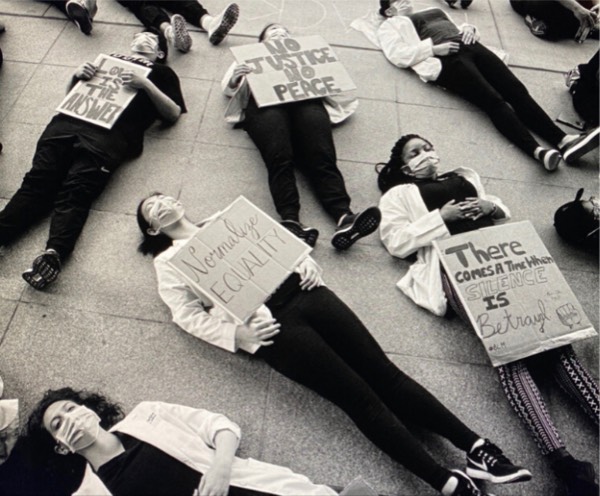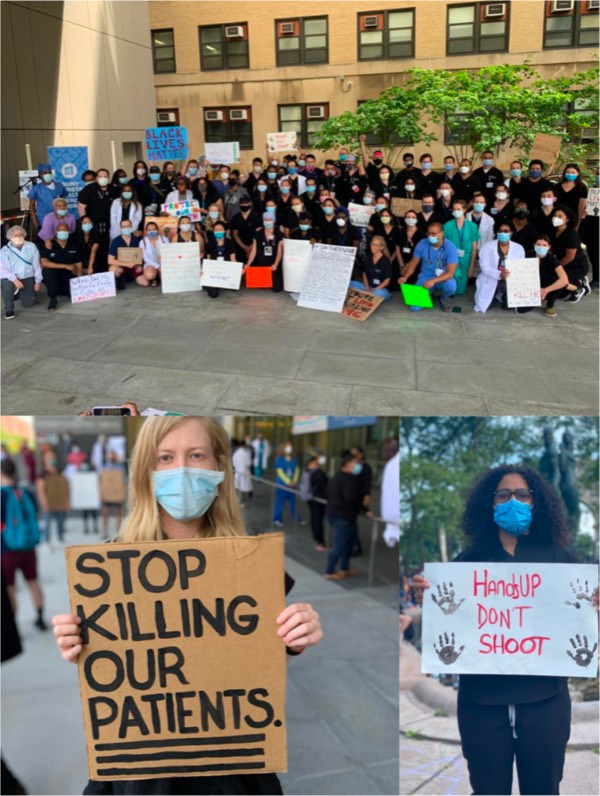Housestaff Council
Diversity and Inclusion Mentorship Program at SUNY Downstate
To provide both faculty to trainee mentorship as well as peer-to-peer mentoring for residents and fellows from all backgrounds who may face unique challenges based on their diverse experiences. This program aims to provide mentorship across departments using both individual and group mentorship to help increase support to trainees as they navigate the challenges of the training experience, with the hope that this will not only help them become successful physicians, but to reach their full potential.
What We Do:
- Provide individual Faculty-Trainee mentorship pairings based on self-identified URM identification, areas of interests, social identities. These pairings are may often be interdepartmental and are not meant to provide career goal mentorship but are here to provide the social, emotional and spiritual support that is often lacking for underrepresented minorities
- Provide mentorship groups composed of trainees of similar self-identified backgrounds that face unique challenges with a faculty advisor from a similar background. These groups will have open communication and regular meetings as dictated by the group needs. Some examples include (but are not limited to): LGBTQ in medicine, Black in Medicine, LatinX in Medicine, Women in Medicine and Parenting in Medicine. Groups will include support for one another across departments and may also choose to host events to increase awareness and education to the larger Downstate Community.
Please complete this survey if you’re interested in joining the mentorship program. Filling out this survey in its entirety allows us to assign you to the most appropriate faculty and/or groups to achieve your mentoring goals.
Below are some additional resources for mentors/mentees:
- Links:
- Articles:
- Bonifacino E, Ufomata EO, Farkas AH, Turner R, Corbelli JA. Mentorship of Underrepresented Physicians and Trainees in Academic Medicine: a Systematic Review [published online ahead of print, 2021 Feb 2]. J Gen Intern Med. 2021;1-12. doi:10.1007/s11606-020-06478-7
- Colford C, Kraemer MS, Contarino M, et al. After the Match: Cultivating a Community of Support, Retention, and Mentoring to Enhance Diversity. Am J Med. 2018;131(12):1520-1523. doi:10.1016/j.amjmed.2018.07.029
In the summer of 2020, the Diversity Equity Inclusion Housestaff Council was formed in the wake of the murder of George Floyd. Our community was galvanized to help eliminate racial disparities, to be advocates for social justice, and to create a culture in which our black and brown communities feel safe. On April 21st, 2021, accountability was served when Derek Chauvin, the cop who killed Mr. Floyd, was convicted for murder on all counts. It took 8 weeks in a year of global and national protests, and 8 weeks of dedicated courtroom time, to arrive at this verdict.
And yet, it feels as though we are back where we started. Less than a month before the verdict, a 13-year old Latino boy, Adam Toledo, was shot by the police, with his hands up. A few days prior to the verdict, just a few miles from where Mr. Floyd was murdered, a 20-year old unarmed Black man named Duante Wright was killed in his car by a police officer, after being pulled over for expired registration tags. And as Derek Chauvin’s verdict was being announced, a 15-year old Black girl, Ma’Khia Bryant, was shot by a police officer after she called 911 for help. If justice was truly served, if justice was a part of our justice system, all of these people, including Mr. Floyd, would still be alive.
A few weeks ago, we composed a letter condemning violence against AAPI communities. Shortly after, on April 15th, 2021, a gunman opened fire in an Indianapolis FedEx facility in a heavily Sikh-populated area, killing 8 people, 4 of whom were Sikh.
It is exhausting for our minorities to have to witness this time and time again, and to mourn and fight for the basic right to live; all at the same time. There is an emotional toll to carrying that fear for their safety, every day, every year - every decade. The Diversity, Equity & Inclusion Housestaff Council members are part of all these communities, and our council condemns police brutality, gun violence and systemic racism. Our council is composed of both allies and members of these communities. This is a call to our allies, to advocate for our minorities and to provide them reprieve so that they can mourn - so that they are not alone in the fight against systemic racism and oppression.
To all the members of our council and community who show up every day, in the midst of a prolonged pandemic, who continue to advocate against racism, social disparities and demand justice for families who have lost their loved ones - we are proud of your commitment. You are our biggest strength, our most valuable resource. Your strength in the face of these tragedies is inspiring and continues to fuel our desire to make the goals of this council a reality.
Sincerely,
Diversity, Equity and Inclusion Housestaff Council
The month of March 2021 was to be a silent wake for the trauma we all suffered collectively over the course of the last year. Some of us started the month pondering the upcoming anniversary of the beginning of the pandemic, some of us grieved the anniversary of Breonna Taylor’s death, while others of us chose to think of vaccinations, and the widespread awareness regarding systemic racism and police brutality, focusing on what we could do to the end the endemic of hatred.
And then, we witnessed another humanitarian horror - a surge in violence against members of the AAPI (Asian-American Pacific Islander) community, culminating on March 16th, when a shooting in Atlanta which killed 8 people, 6 of whom were women of Asian descent. Prior to this, the group Stop AAPI (Asian-American Pacific Islander) Hate reported close to 3,975 hate incidents against Asian Americans between March 19, 2020 and February 28, 2021.
Since the start of the COVID-19 pandemic, Asian Americans have had to deal with the bigotry of being blamed for the pandemic, an idea that was reinforced by the previous administration. The COVID-19 pandemic has reinforced a strong, rising tide of misguided nationalism, bringing to the forefront an alarming level of racist and xenophobic beliefs that further marginalize minority groups. Although in New York City, which boasts diversity and has long been a haven for Asian immigrants, hate against AAPI has still taken root. Hate crimes against Asian-American victims soared in NYC over the last one year.
The Diversity, Equity and Inclusion Council (DEIHC) stands in solidarity with our Asian-American employees, students, trainees, faculty, staff and patients against any bias or hate directed against them. Our strength comes from embracing our diversity and all that our varied perspectives and backgrounds bring to our community. An attack on a member of our community is an attack on all of us, and we are privileged to have members from the Asian-American community be a part of the DEIHC. You have all been integral parts of shaping this council and it would not have been possible to sustain the work we are doing without your ongoing efforts.
We stand with you, AAPI.
Resources to help the Asian-American Pacific Islander Communities:
New York Hate Crime hotline: report hate crimes, either experienced or witnessed, related to COVID-19 pandemic by emailing the Attorney General’s Civil Rights Bureau at civil.rights@ag.ny.gov or calling 1-800-771-7755.
|
|
|
2020 was one of the hardest ones yet for our patient community. The COVID-19 pandemic brutally reinforced how racial inequality leads to worse health care outcomes in our patients than in other NYC communities. The murders of Breonna Taylor and George Floyd further solidified the role of systemic racism in our patients’ futures. In response, we mobilized our Downstate community to fight against racism by organizing an afternoon of speeches and a demonstration on 6/4/20.
The GME Office has developed this Diversity, Inclusion and Equity Housestaff council in an effort to streamline projects across multiple residencies and to provide adequate support, resident personnel and resources to projects.The ultimate goal of this council is to eliminate racial health care disparities by increasing sustained diversity in health care, increasing community engagement, implementing research in social determinants of health and racism, introducing advocacy and social justice into resident curricula. These are substantial goals requiring years of hard work and sustainability - and our creative, passionate residents are an excellent resource to set the work in motion.
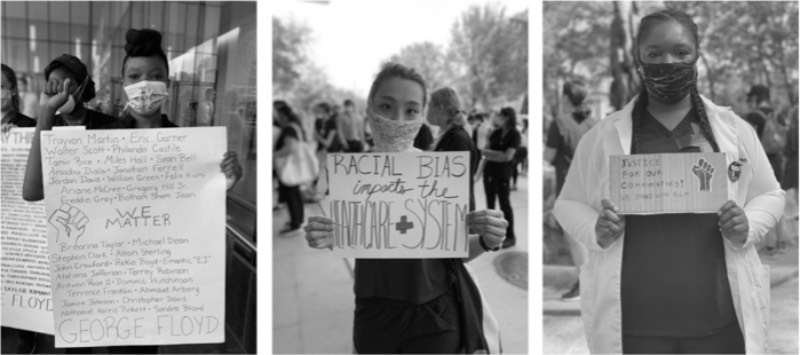
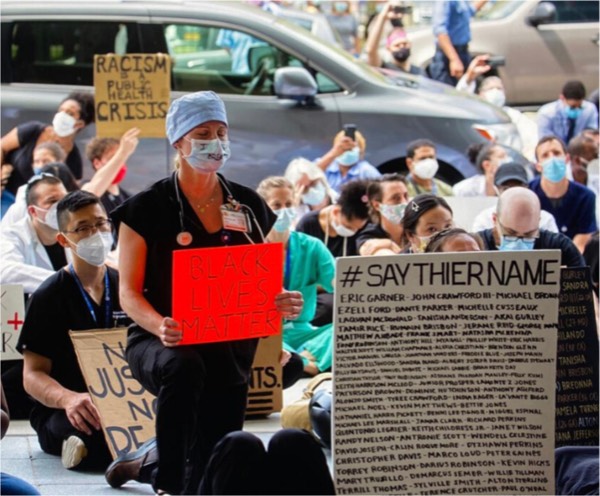
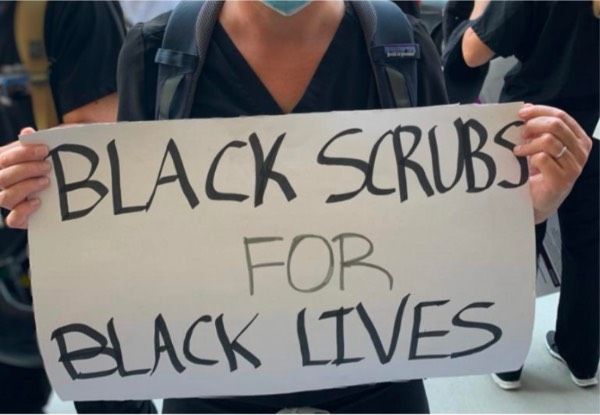 |
|
